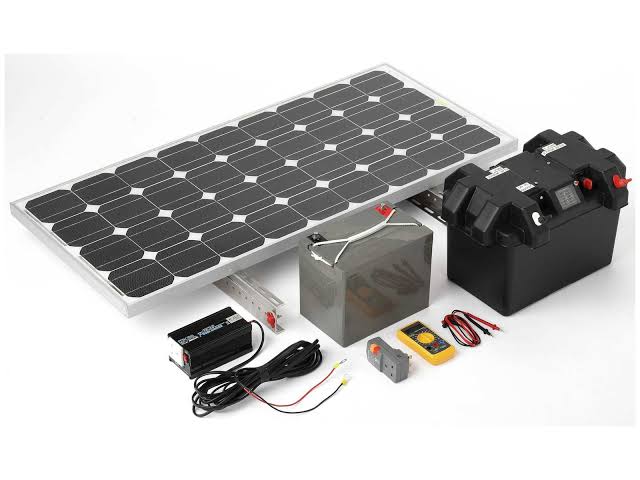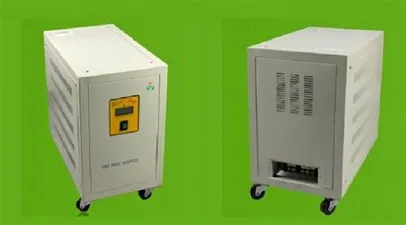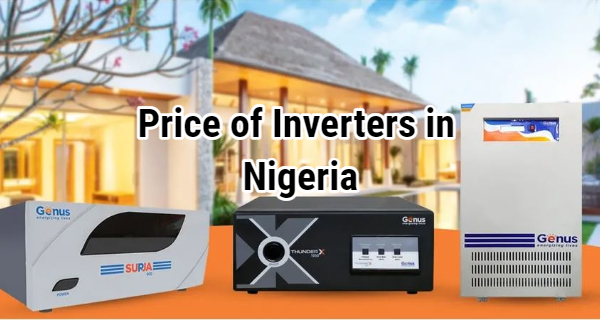Inverters are another course of action for a power generator when you talk about providing reserve or standby power when the lights go out. The price of inverters in Nigeria varies according to the type of inverter or the company that produced it.

Inverters transfer DC voltage from a battery to AC voltage. They are then consumed by equipment in our houses and workplace. Today, inverters have become a major source of power supply for Nigerians due to the country’s scarcity and high cost of fuel.
Standby power is now crucial in Nigeria due to the terrible power supply across the country. Take a look at the price of inverters in Nigeria. The suppliers and a few reasons why inverters might be a better option over generators that consume petrol for backup power supply.
Price of Inverters in Nigeria
The prices of inverters in Nigeria that are listed here do not contain the price of Battery and Installation. The prices of inverters highlighted on this list are just to serve as a direction for you if you want to purchase one.
Here are the prices of inverters in Nigeria that you can go for:
Prices of Famicare Inverter
- Farmicare 1 KVA / 12V – 35,000 Naira
- Famicare 2.5KVA / 24V – 90,250 NGN
- Famicare 3.5 KVA / 24V – 192,000 NGN
- Famicare 10KVA / 48V – 361,000 NGN
- Famicare 5.5KVA / 24V – 178,000 NGN
Bluegate Inverter
- Bluegate 1KVA / 12V – 60,000 Naira
- Bluegate 2KVA / 24V – 66,000 NGN
- Bluegate 3.5KVA / 24V (Rack Mount) – 155,000 NGN
- Bluegate 5.5KVA / 24V (Rack Mount) – 207,000 NGN
- Bluegate 10KVA / 192V – 494,000 NGN
PSC Solar Xantra Inverter
- 1.5 KVA / 12V – 97,500 Naira
- 1.5KVA / 24V (Online Inverter) – 99,500 NGN
- 2.5KVA / 24V – 214,900 NGN
- 3.5KVA / 48V – 289,900 Naira
- 6KVA / 48V – 455,500
- 10KVA / 96V – 675,000 Naira
SEE: DELL Laptop Prices in Nigeria 2023
Tripp Lite Inverter
- Tripp Lite 1.2KW / 12V – 173,000 Naira
- Tripp Lite 2KW / 12V – 150,000 NGN
- Tripp Lite 2.5KVA / 24V – 199,000 NGN
Luminous Inverter
- 1.5KVA / 24V – ₦79,700
- 2.5KVA / 48V – ₦152,400
- 3.5KVA / 48V – ₦205,100
- 5.5KVA / 96V – ₦427,800
- 7.5KVA / 120V – ₦600,000
- 10KVA / 180V – ₦720,000
- 1.5KVA / 24V (wise Inverter ) – 85,000 Naira
- 1050VA / 12V (ECO VOLT) – 81,500 Naira
- 850VA / 12V (Solar Hybrid) – 64,000 Naira
- 1.5KVA / 24V (Solar Hybrid) – 90,000 NGN
Mercury Inverter
- Mercury 1.2KVA / 12V (Modified Sine Wave) – 35,000 Naira
- Mercury 2.4KVA / 24V (Modified Sine Wave) – 42,000 NGN
- Mercury 3KVA / 24V – 209,000 NGN
- Mercury 5KVA / 48V – 280,000 NGN
- Mercury 7.5KVA / 120V – 370,000 NGN
- Mercury 3KVA / 24V – 209,000 NGN
READ: Power Bike Prices in Nigeria
Sukam Inverter
- Sukam 900VA / 12V – 52,500 Naira
- Sukam 1.6KVA / 24V – 96,500 NGN
- Sukam 2.5VA / 48V – 200,000 NGN
- Sukam 3.5KVA / 48V – 240,000 NGN
- Sukam 5.0KVA / 96V – 415,000 NGN
- Sukam 7.5KVA / 120V – 540,000 NGN
- Sukam 10KVA / 180V – 661,500 NGN
- Sukam 15KVA / 360V (3 Phase) – 1,438,000 NGN
- Sukam 20KVA / 360V (3 Phase) – 1,713,000 NGN
- Sukam 25KVA / 360V (3 Phase) – 2,173,500 NGN
- Sukam 30KVA / 360V (3 Phase) – 2,633,000 NGN
- Sukam 40KVA / 360V (3 Phase) – 3,438,000 NGN
- Sukam 50KVA / 360V (3 Phase) – 5,640,500 NGN
Prag Inverter
- 1KVA / 12V – 69,500 Naira
- 1.2KVA / 12V – 76,600 Naira
- 1.45KVA / 24V – 83,100 Naira
- 1.5 KVA / 24V – 96,200 Naira
- 1.5 KVA /24V (Solar) – 123,400 Naira
- 3 KVA / 24V – 155,300 Naira
- 3 KVA / 24V (Pro Edition) – 487,000 Naira
- 3.5KVA / 48V – 197,700 Naira
- 4 KVA / 24V – ₦288,000
- 5 KVA / 96V – ₦319,700
- 6KVA / 48V (Pro Edition) – ₦838,500
- 7.5 KVA / 120V – 449,200 NGN
- 10 KVA / 180V – 503,700 NGN
SEE: Dstv Packages in Nigeria: Prices and Plans
MPower Inverter
- 800 VA / 12V – 57,500 Naira
- 1.2KVA / 12V – 46,000 NGN
- 3KVA / 24V – 188,000 NGN
Prices of Inverter Batteries in Nigeria
The batteries of the inverter propose 12V and come in three major sizes: 100 AH, 150 AH, and 200 AH. Going for the 200AH battery will be a good suggestion because they give better user proficiency.
Prices of Inverter Batteries
- 12V / 100Ah – 52,500 Naira to 220,000 Naira
- 12V / 150Ah – 99,000 Naira to 300,000 Naira
- 12V / 200Ah (Recommended) – 104,000 NGN to 300,000 NGN
- 2V / 500 Ah – 90,000 NGN to 150,000 NGN
- 2V / 600 Ah – 94,000 NGN to 150,000 NGN
- 2V / 750 Ah – 155,000 NGN to 200,000 NGN
- 2V / 1500 Ah – 270,000 Naira to 350,000 Naira
READ: Lagos to Abuja by road Prices 2023
Advantages of Having an Inverter

Does not Require Petrol or Diesel
One good advantage of an inverter is that you do not need petrol or diesel. This one competence comes with lots of advantages. First, it removes the dangers of refuelling generators or keeping petrol the wrong way. There have been many cases of fire razing too many houses and workplaces due to improper keeping of petrol.
A further advantage of the inverter not needing petrol is that you don’t need to visit the fuel station in search of petrol. Inverters get their power from batteries. All you have to do is to get the battery charged. Then you can use it.
Low Cost of Running
Because you do not need fuel for inverters, they operate with almost nothing asides from you just getting the battery charged. Although the cost of purchasing an inverter is high, but the cost of running is relatively low compared to how much you spend on running and maintaining a generator.
Actually, in the long run, the cost of running an inverter is cheaper, especially in our beloved country where the generator is almost the primary source of power for running our daily activities. So, though Inverter prices are high, they involve very little running cost, especially if you buy a good one.
RELATED READS:
- Slot Nigeria Gadgets and Phone Prices 2022
- How Much is an Apple Laptop in Nigeria?
- Mattress Sizes and Prices in Nigeria
Inverters are Free of Noise
A lot of Inverters operate silently. Not like generators that are bound to hurt your ears with too much noise and your neighbours. Inverters make very small or zero noise that you can hardly be disturbed by any sound.
The only noise you will hear from the machine is the fan and the clacking of relays. Therefore, if you want a silent operation in your home, you should take a look at inverters.
Inverters give zero Discharges
Due to the fact that inverters do not require petrol and do not have an inner ignition engine. They do not discharge dangerous gases when they’re running. This is significant because you can have an inverter inside your room or within your house. Similar to how you have your UPS, without any danger of choking.
The health risk of choking from generators is a very common occurrence these days, and having an inverter as an alternative is a good way to avert that. If your place of residence is not conducive enough for you to have a generator, then you should consider an inverter.
Don’t be bothered about the cost of an inverter, as it can limit the danger of choking from harmful gases.
READ: Daily Income Business in Nigeria
FAQs for Price of Inverters in Nigeria
What can a 3.5 KVA inverter power?
A 3.5 kVA inverter is good enough for a 5- 7 bhk home for running 15-20 led bulbs, 5-7 fans, 1 television, 1 mixer, and a small 160-litre refrigerator during power cuts.
How much is a 2.5 KVA inverter in Lagos?
₦145,000.00 ₦135,000.00 excluding delivery and installation fee.
What size inverter is needed to run a house?
Ideally, inverters between 756-1000 W are best suited for homes. There are several other types of inverters based on capacity as well. You need to choose the best for your requirements. Batteries run the inverter.
How many hours can the inverter lasts?
In general, you can expect your inverter battery to last around 5 to 10 hours when fully charged. However, you can easily calculate the accurate battery backup time with a simple formula or use a battery backup calculator.
Can a 2KVA inverter carry a fridge?
A 2 kVA inverter is good enough for a 4- 6 bhk home for running 10-16 led bulbs, 3-4 fans, 1 television, 1 mixer, and a small 160-litre refrigerator during power cuts.
Is a 5kw inverter enough to run a house?
The SA 5kw 10 hours home conversion system provides a 5kw SA solar inverter with 10kwh solar PV power, which can provide your home with sufficient power during the day.
What are the 3 types of inverters?
There are 3 major types of inverters – sine wave (sometimes referred to as a “true” or “pure” sine wave), modified sine wave (actually a modified square wave), and square wave.
Does an inverter use a lot of electricity?
The power required to run an inverter is approximately 8-10% more than the power load of the appliances being run. This is due to the efficiency of the inverter.
Inverters are not as common as our generators in supplying power to our homes. This is mainly because of the great cost.
Moreover, an inverter is a more costly choice than an electric generator. The price of inverters in Nigeria may be high, but it has major advantages that will make it worth every penny you spend on them.





